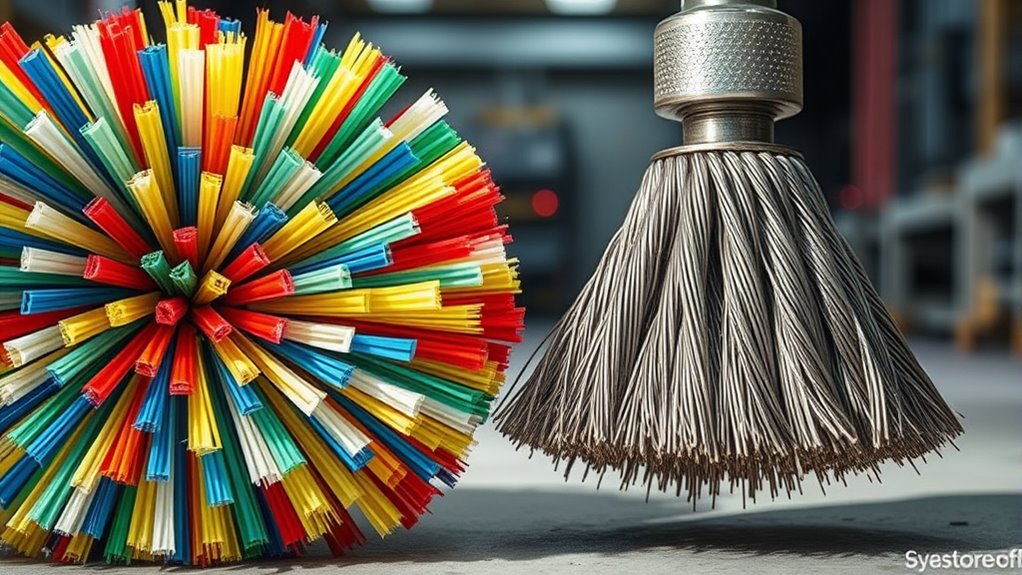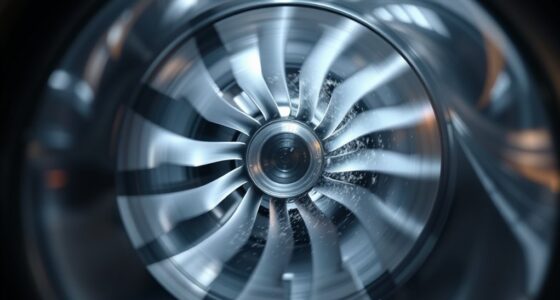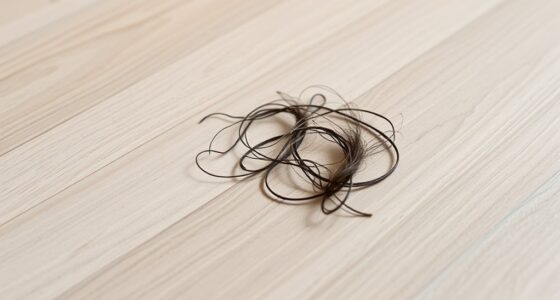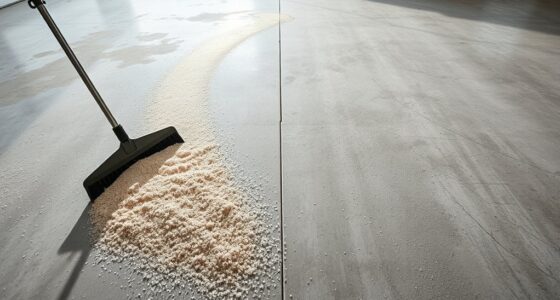When choosing brush types for sweepers, consider the surfaces you’ll clean. Poly brushes are gentler and ideal for delicate floors or surfaces prone to scratches, offering easier maintenance and good cost-effectiveness. Wire brushes are tougher, perfect for removing stubborn debris, rust, and grime in industrial settings, but may cause damage if used on sensitive surfaces. To guarantee ideal cleaning and surface safety, paying attention to material durability and maintenance needs is key—there’s more to discover if you keep going.
Key Takeaways
- Select poly brushes for delicate surfaces to prevent scratching and surface damage.
- Use wire brushes for heavy-duty cleaning tasks involving rust, stubborn debris, or industrial environments.
- Consider durability needs; wire bristles generally last longer and withstand tougher conditions.
- For routine maintenance and surface protection, poly brushes are more cost-effective and easier to maintain.
- Match brush material to cleaning surface sensitivity and debris type to optimize efficiency and prevent damage.

Selecting the right brush type for your sweeper is essential to achieving peak cleaning performance. When choosing between poly and wire brushes, you need to consider how each type impacts bristle durability and maintenance requirements. Poly brushes, made from synthetic materials, are designed to be flexible and gentle on surfaces. They’re ideal for delicate floors or surfaces that could be scratched or damaged by harsher materials. Their bristle durability tends to be moderate, meaning they may wear down quicker when used on rough or abrasive surfaces. However, they are generally easier to maintain, needing less frequent replacement and simple cleaning to remove debris caught in the bristles. This makes poly brushes a practical choice for regular, everyday cleaning tasks where surface protection is a priority.
Wire brushes, on the other hand, are constructed with metal bristles, often steel or stainless steel. They excel in tougher cleaning situations, such as removing stubborn debris, rust, or heavy grime from industrial floors and concrete. The bristle durability of wire brushes is considerably higher, allowing them to withstand rigorous use without quickly wearing out. However, this increased durability comes with higher maintenance requirements. Metal bristles can become bent or frayed over time, and they require periodic inspection to ensure they’re still effective and not causing damage to the surfaces being cleaned. You’ll also need to be more vigilant about cleaning out accumulated debris, as wire bristles tend to trap dirt more readily, which can reduce their effectiveness if neglected.
In addition, choosing the appropriate brush type can extend the lifespan of your sweeper and optimize its performance in different environments, especially considering the Kia Tuning options available for enhancing vehicle handling and durability, similar to selecting the right brush for your cleaning needs.
Choosing between these two brush types depends on your cleaning needs and the surfaces you’re working on. If you prioritize gentle cleaning with less downtime for maintenance, poly brushes are usually the better fit. They’re cost-effective and simple to keep in good condition, making them suitable for routine tasks. Conversely, if you’re tackling industrial or heavy-duty cleaning where durability is critical, wire brushes offer the strength and longevity you need, despite requiring more attentive maintenance. Remember, selecting the wrong brush can lead to premature wear or even damage to your surfaces, so consider the bristle durability and maintenance requirements carefully before making your decision. Ultimately, understanding how each brush type performs in terms of durability and upkeep will help you make an informed choice that keeps your sweeper running efficiently and your cleaning outcomes ideal.
Frequently Asked Questions
How Do Brush Types Affect Sweeper Maintenance Costs?
Brush types directly influence your sweeper’s maintenance costs through their durability and replacement needs. Poly brushes tend to last longer and resist wear better, reducing replacement costs over time. Wire brushes, while more aggressive, wear out faster and may require more frequent replacements, increasing overall expenses. By choosing the right brush type for your cleaning needs, you can lower maintenance costs and extend the lifespan of your sweeper.
Are Wire Brushes Suitable for Delicate Surfaces?
Wire brushes are generally not suitable for delicate surfaces, as their abrasive nature can cause damage. Studies show that using abrasive-compatible brushes on gentle surfaces increases the risk of scratches and wear. If you need to clean sensitive materials, opt for poly brushes instead, since they offer gentler cleaning without sacrificing effectiveness. Always choose the right brush type to protect your surfaces and maintain their appearance.
Can Brush Types Be Changed Mid-Operation?
Yes, you can change brush types mid-operation, but you need to make certain the brush compatibility with your sweeper model. Follow the replacement procedures carefully to avoid damaging the equipment. Turn off the machine, disconnect power, and remove the current brushes securely before installing the new type. Always consult your sweeper’s manual to confirm compatibility and proper installation steps, ensuring smooth operation and preventing unnecessary wear or damage.
What Is the Lifespan Difference Between Poly and Wire Brushes?
Poly brushes generally have a longer lifespan than wire brushes, offering better brush durability and requiring less frequent replacements. You can expect longer replacement intervals with poly brushes, which makes them cost-effective over time. Wire brushes tend to wear out faster due to their more aggressive bristles, leading to shorter durability. Your choice depends on the cleaning task, but if longevity is a priority, poly brushes are usually the better option.
Do Different Brush Types Impact Cleaning Efficiency on Uneven Terrain?
You might think all brushes perform equally on uneven terrain, but brush material substantially impacts terrain adaptability. Wire brushes excel at removing stubborn debris and adapting to rugged surfaces, while poly brushes are gentler and better suited for delicate ground. So, selecting the right brush material directly influences cleaning efficiency on uneven terrain, ensuring you get thorough results without damaging surfaces. The right choice depends on your specific cleaning environment and needs.
Conclusion
Choosing the right brush type is like finding the perfect dance partner—you need harmony to make the job effortless. Poly brushes glide smoothly, like a gentle breeze, ideal for delicate surfaces. Wire brushes, on the other hand, are the fierce warriors, tackling tough debris head-on. Pick wisely, and your sweeper will be your trusty steed, ready to conquer any mess. When you match the brush to the task, cleaning becomes a breeze, not a battle.









